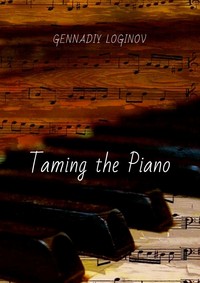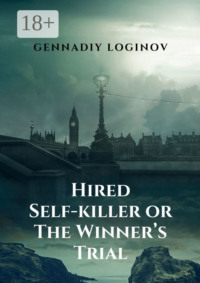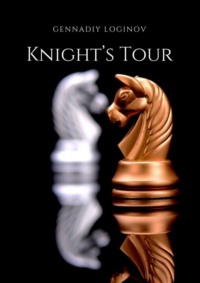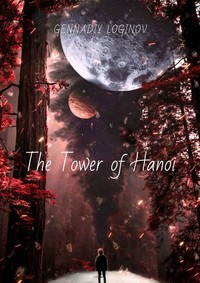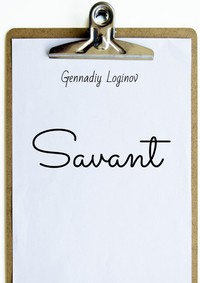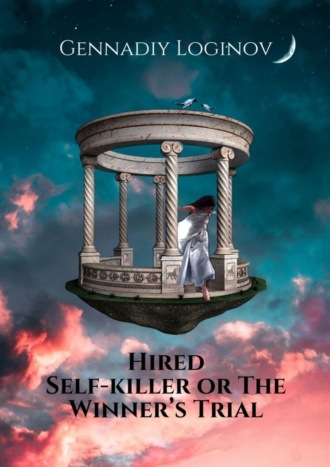
Полная версия
Hired Self-killer or The Winner’s Trial
Anyway, imaginary good fortune brought Lucky (as he was sarcastically called) only misery and suffering. And by no means could he resist this ill fate. Although, perhaps, it was just a God sent trial.
He could recall only one incident from his childhood when he apparently had bad luck in a matter which was dear to his heart: it was also a kind of playing, not with cards, but an instrument. At that time, the lid of the piano fell and hit him hard on his fingers, discouraging the budding desire to become an outstanding player. Over time, the initial flexibility of the fingers and abilities had been recovered, but his hope to establish himself in this field somehow had burnt itself out.
Later, he trudged to war, where he was invincible against either an enemy bayonet or a bullet; he received many decorations and medals, but couldn’t make a military career because of another scandal related to gambling. Of course, everyone was enthusiastic about card play, but it was his “luck” that dragged him into such litigations. Taking into account his past merits, they didn’t punish him severely but forced him to leave military service. However, he fulfilled his duty to the army completely.
At first, he tried to hang himself – the rope broke, and he suffered only a painful bruise falling to the floor. Then he wanted to shoot himself: at the first attempt, the gun misfired, at the second it just backfired, injuring his hand. Then he jumped off a bridge, but the good Samaritans promptly fished him out of the cold city canal and brought him to his senses. Further: he tried to stab himself with a dagger, but powerlessness paralyzed his hand, forcing him to drop the weapon in another failed suicide. Then he decided to throw himself under a train, but it derailed shortly before arriving and miraculously avoided a meeting with Lucky. To top it off, he climbed onto the roof of a building with the firm intention of jumping and crashing to the pavement. It seemed that now he had foreseen everything, then no chance happening could save his life; but what he couldn’t foresee was the exact moment before the fatal landing – he just suddenly woke up in his bed, . And so, again and again, time after time, something prevented his tragic plans from coming true. as if it was an ordinary dream
Realizing that he was, in fact, powerless to commit suicide, he despaired even more, although it seemed to him earlier that it was principally impossible. Not knowing where he was going and why, Lucky simply wandered through the streets, whistling a sad song: the words were forgotten, it was just a single tune, and for some reason, it reminded him of the yellowed skeleton of a dead man, freed from the once rotten flesh.
Of course, he could roam around the grim backstreets, pestering all sorts of sinister characters, hoping to get stabbed with someone’s knife. Or bypass the brothels, asking to pick up some terrible infection. Or, at the very least, switch to morphine, alcohol or opium, getting himself into a deadly condition. But he suspected that these ridiculous ventures would end no better than all the other nonsense before.
From the outside, it might seem that the problem was contrived. One way or another it was possible to simply move to a new place, starting over with a clean slate, making new acquaintances, finding a wife and a job, quitting the gambling permanently or, at least, be only interested in games in which the role of luck is insignificant compared to skill and calculation. Naturally, all this came to mind a great many times, but every time he tried to implement the plan, he faced the same difficulties as when trying to take his own life.
Some force not only stopped him from trying to do something that it didn’t like, but also compelled Lucky to behave as it pleased. Having given all the money to the poor and the churches, he remained a villain in the public eye; simply, in addition to all the adjectives, also self-righteous and hypocritical. He could find more money literally on the street around the corner from a gin mill or other den, where the whole caboodle was going to play. And again, an unknown force drew him inside, sweeping away the attempts of the will, as a mighty stream sweeps away a pathetic straw. And it ended the same as any previous re-locations, a flawed reputation in a new place and aggravated depression.
Deep in bitter thoughts, Lucky came across a yard, and he could vouch, he had never been here before, although he knew these places like the back of his hand. Of course, there were such nooks in the city that were off-limits to strangers, but this place wasn’t one of them. Anyway, the wanderer didn’t make guesses but went ahead where his feet took him.
There was an enormous fountain in the middle of the yard. Lifeless and gray, it was dry and cracked in places; and beside it, stood a bearded man (somehow resembling the King of Hearts from the marked deck of one sharper) with a barrel organ (somewhat resembling a die), looking at the raven, who was sitting up at the top of the dead fountain with an air of importance. A timid light glowed behind the windows overlooking the courtyard, and illuminated by a melancholic moon, the snow danced and fell, covering the ground. At the sight of the man, the organ-grinder turned the crank of his instrument, enlivening the evening silence with the sound of unpretentious music. The raven dived from the fountain and landed on a shoulder of the playing man with the first sound of the melody.
“You’re out late, dear man. At this hour, all good people are sitting at home and not hanging around the backstreets. You are lucky that no one stabbed you,” the bird master unexpectedly declared, continuing to rotate the crank slowly.
“It depends on how you look at it,” Lucky remarked with a sad smile and a shade of irony.
Coming closer, Lucky stopped in front of the organ-grinder, listening to the tune, and gave the bird a side glance. The raven squawked. Lucky threw a coin into the slot for donations on the barrel organ and briefly glanced at the fountain. People usually threw coins at working fountains for good luck, which in his case would be an evil mockery. Perhaps, everything should be exactly the opposite with the extinct fountain? In any case, Lucky had never heard of such a belief. But even so, it was unlikely that anyone else in this world had a reason and a desire to verify the validity of this guess.
However, Lucky had nothing to lose. At least, there would be something to remember later, looking back on a passing day. He casually tossed the coin into the dry fountain and sighed with a flow of white steam. That’s just empty superstitions. Good luck and bad luck are relative concepts anyway.
“Places like that have their own charm,” the organ-grinder said in a deep velvety voice. “Fountains, where water no longer spurts; stations where trains no longer arrive; clay beds of dried rivers, where old boats remain and objects once sunk are exposed; the ruins of old houses, overgrown with moss and ivy, where different things like pianos have been left behind and now have birds nesting in them, and so on in the same vein.”
“Perhaps. Probably,” the suicidal failure agreed. He could broadly envisage the bizarre aesthetics of decline and desolation (about which, in Lucky’s opinion, the organ-grinder spoke). “I’ve been in this city for quite some time. But I’ve never met you before. And I don’t remember this fountain either.”
“No wonder,” the stranger nodded with understanding. “This place is found only by those who are not looking for it on purpose. I don’t know what happened to you, but apparently, you didn’t care where you were going. You have neither purpose nor motive.”
“So it turns out,” Lucky agreed once again. Nothing could surprise him anymore.
“All this is very strange of course. But since you are here, I believe, you have your own story, just as unusual as everything around. I have a trained eye – I’ve seen many people alike in my lifetime,” the bearded man stopped his barrel organ and petted the raven. “Come on, come on, say ‘Nevermore!’ Please, entertain our guest! Don’t you want to? Oh well…”
Lucky looked at the organ-grinder with new eyes. For some reason, this man caused associations with the main character of a literary work, who found himself in the wrong story by some ridiculous accident.
“So you think that I can find some answers to my questions here?” Lucky asked. He took some snow from the edge of the fountain and rubbed it in his hands, feeling the moderately pleasant bite of cold.
“I can’t guarantee anything. It’s entirely up to you. They don’t come here for answers. They simply come when there is nowhere else to go, and there is no need to go. And everyone leaves, having received something. Or not. Taking some thoughts. Or not taking, but killing time well, after having acquired some aesthetic experience. You just find a reflection of yourself in things and in understanding things, and this can help in your trouble, whatever it is. Well, maybe not. It’s one out of two outcomes. Or maybe more than two,” the raven’s master assured indifferently. “Sometimes, the lessons we learn are fundamentally different from those that somebody is trying to teach us. Perhaps you’ll decide something important for yourself. Or maybe you won’t. Perhaps your inspiration will awaken, and you’ll find a new incentive to live. Or maybe there will be no inspiration, no incentive. At times, even the information which seems senseless or useless by its nature gives us interesting ideas. You can’t deny random knowledge.”
“It all sounds good,” Lucky replied with the same calmness. Having the experience of his non-standard life, with ill-fated fortune and the rich experience as those of a serial self-killer, he wasn’t surprised by the existence of unusual places, objects and people. “Frankly speaking, I’m interested. I didn’t have special plans for this evening anyway, neither for the near future. But who are you?”
“The organ-grinder,” the bearded man answered as if it was obvious. “And my name is Joe Ker.”
“And what have you found here for yourself, Joe Ker?” continued the wanderer, hoping to get more out of his interlocutor. “Has someone appointed you to stand in this place and speak with lost travellers?”
“No, nobody forced or obliged me to do anything. Once, I accidentally wandered here just like you, I liked it here, and I decided to stay. But don’t think that you’ll be able to escape your problems and remain here, waiting for solutions from me or someone else. No, you can only try to sort yourself out. Of course, if you want to. You can even turn around and leave, but bear in mind that someone can wander into this place twice in extremely rare cases: they get here for the first time without such a goal and intention, but they can’t return here at a wish. I had my questions too, and I think, I found the answers. Now I’m doing something that interests me, and I’m where I want to be. I just like it here.” The bearded man slapped the raven, and it rushed up, squawking: “Nevermore! Nevermore! Nevermore!”
“But who created this place and for what purpose? Why do the wanderers end up here?” interrogated Lucky.
“‘Who…’ ‘For what purpose…’ ‘Why…’ By God, what a bore you are. Well, alright, not a bore, a curious person. Yes, of course, the right questions are not only possible but even necessary to ask. Another thing is that it’s sometimes tiring to answer all the same questions for the tenth time. Well, let’s go, if you wish,” the bearded organ-grinder suggested. He turned around and headed to the nondescript door of one of the houses, inviting Lucky to follow.
The door swung open with a creak and flooded the night winter square with a stream of bright rays of the hot summer sun. Behind it, surrounded by a blossoming forest alley, there were tram rails leading somewhere far off, and upon them stood a giant cabinet-tree, with large and small road signs blooming on the branches; there was also a cozy gazebo on wheels. Inside it, there were a couple of hungry armchairs inviting in their open, fanged maws, a wicker five-legged table, on which, in a large bowl, there was a small pond with water lilies; next, stood porcelain cups full of heels and a telescope, which seemed a bit strange and inappropriate to Lucky.
“You have a nice place here. Some others’ are so disgusting, you don’t even want to cross the threshold. And here is not bad at all,” the organ-grinder nodded respectfully. “Well, what next?”
“Shouldn’t I be asking you that?” Lucky said as he crossed the threshold. He turned his face to the sun and, closing his eyes for a moment, took a deep breath filling his lungs with fresh air. A gentle breeze blew. What a grace.
“Well, actually, this is inner world. And you will show the way. We can take a walk in mine someday if you want to and have the time,” the bearded man said in a deep voice, following Lucky. your
“I wonder, who prepared all this and arranged it specially for our arrival?” inquired Lucky, climbing into the gazebo with confidence and landing in one of the maws. Picking up the telescope, he looked at the sky. Here is the sun in the frame of the lampshade. If it interferes with stargazing, then perhaps it’s better to turn off the light. But so far, everything seems visible, although it’s difficult to find a particular star in such a cluster. Lucky put away the telescope for a short time, rubbed the lens and looked again. It worked – now among all the stars in the sky, was the one he needed. Having adjusted the focus of the lens, he suddenly saw himself with a telescope in his hands, looking back at him from the other side.
““If I were you, I wouldn’t ask myself about the ontological status of an object until I met it. Rationalizing the irrational, you…” the raven’s master snapped his fingers, trying to find the right word. “Well, in general, all this exists only in the context of displaying the inner essence of the person’s perception, who can share his vision with others, since this particular part is nothing more than an element that obeys the general rules and laws of the world.”
“Alright,” responded Lucky, not really understanding his words, but not really wanting to understand. He put the device aside, took the cup by the heel and, tasting fresh coffee, gestured to the bearded man to join him. “Please help yourself.”
“Thank you, don’t mind if I do,” the organ-grinder accepted the invitation and took another chair aside. “Well, are we going to sit like this or, maybe, move on little by little?”
“Well, we can go, if you know how,” Lucky agreed without much debate.
“In the same way as you force visions to move in your imagination,” his interlocutor explained.
A pleasant breeze was blowing. Aside from the front door, the mousetrap mechanism suddenly activated, catching the clockwork mouse. On the branch, a flute-beaked bird started to sing; its nest was filled with playing cards, which portrayed dice instead of the usual pictures.
“Let’s ride then,” Lucky ordered, and the gazebo began to move.
Behind the forest, detached sky-blue wallpaper with a distant landscape and horizon could be seen in places. Behind the exfoliated wallpaper, the cosmic darkness gaped. And under the railway, creaked the floorboards. Slowly gaining momentum, the gazebo approached the turn and stopped for a moment, gave way to a bench which ran across the road. Turning and leaving the hallway far behind, the gazebo passed a picturesque waterfall with a bathtub, a water mill and a toilet; bed with a chamber pot, standing on the adjacent rails; a spacious kitchen with boiling pans and alembics, where some homunculi dwelt in bottles of wine, and there was something mermaid-like among the dried fish; and, driving up the staircase, after several flights of stairs, they found themselves on the balcony, continuing the way along the clotheslines, stretched out over the boundless courtyard abyss. Left and right, top and bottom – webs of ropes stretched all around, connecting balconies. All sorts of things could be found on the lines, from chivalric chain mail and jesters’ caps to patricians’ togas and fishing nets. Balconies were also impressive in their diversity – medieval and modern, luxurious and impoverished, royal and petty-bourgeois, well-kept and turned into ivy-twisted ruins. Everything one could imagine was exposed on them, ranging from sculptures and hangers to grazing cattle and harpsichords. Having passed a web of clotheslines, in which the laundry spiders crawled, hanged and collected everything they could, the gazebo came to the middle of a spacious hall, which served as the far edge of a vast forest, spread out on many visible and invisible doors and corridors.
“We’ll stop here for a while.” Lucky’s words sounded more like an order rather than a suggestion.
“If you say so,” the organ-grinder agreed and looked around with interest. From time to time, some people ran through the thickets. They wore homespun tailcoats, resembling the pelts of primitive people, and were armed with mace-shaped trumpets, spear-shaped flutes, bow-like harps and violins with feathered bows.
“And who are they?” cautiously inquired Lucky.
“Savage musicians,” his companion told him, watching the scene with interest. “They are hunting and running the beast. Everyone is waiting for the chief’s command… And here he is!”
From the depths of the forest thicket, with a heavy rumble, followed by a monstrous cacophony, a furious piano jumped out. It was out of tune, overgrown with moss, and behind it, baying it, ran out a formidable leader, accompanied by tall bassists. He had a conducting baton hung with shamanic rattles in one hand, and in the other – a musical score written on the skin with primitive artwork in the spirit of cave paintings. According to the sign of the conductor’s baton – the shamans hit the tambourines. The circle narrowed; the hunters covered the doors, cutting off the escape routes, and the hunted piano threateningly demonstrated its black-and-white-toothed maw, flapping the lid and wiggled the keys. Having played a major chord, it rushed towards the pursuers, but the chief managed to make a wave – and the warriors attacked the mighty prey on all sides without sparing themselves. Fighting with the despair of the doomed, the fierce beast fretted, fumed, spun, butted and bit, snapping with expressionist motifs, while savage musicians fell one by one, pinned down by the piano, but still struggled to capture it alive with their last strength.
“Brute force alone may not be enough to pacify and tame a furious piano,” the organ-grinder shared with passion and excitement. “To achieve his recognition and respect – you need to play well on it.”
Lucky could no longer remain an observer in such a battle and rushed to the attack. He wasn’t afraid of fights, because, for obvious reasons, when he participated in military actions or duels, or in a pub brawl, he invariably walked away unscathed, since neither a bullet, knife or broken bottle, as a rule, could harm him; and when he was occasionally hurt, it was always just a scratch, from which he healed soon.
Having made his way through the field, which was strewn with bodies and broken weapons, he barely had time to shout “Hold the jaw!” to the warriors before he attacked the beast. He hadn’t played the piano since long ago when he was a child, but there had to be something left in his fingers’ memory. He could only hope that the enemy wouldn’t bite them with the lid. Just like last time…
The hunters struggled to restrain the monster, which wobbled and shuffled with all its might, trying to shake them off and shut its maw whenever possible, but these people were not the timid sort.
And the battle began. Fingers ran along the resistant keys like a playing machine and held chord after chord, trying to go everywhere, from edge to edge. At any other time and in other circumstances, the overture might have seemed very entertaining to him, but now it wasn’t amusing at all. Putting the barrel organ on the keys with a loud chord, Joe Ker stood shoulder to shoulder with Lucky, preventing the creature from slamming its maw, and soon they were playing the piano together, four-handed… Battle with the Piano
…Celebrating the victory, the warriors honoured the heroes, while still being a little wary and keeping an eye on the pacified piano, which was now grazing peacefully, nibbling the note sheets. Bad luck had come to an end, and the tribe of savage musicians was incredibly glad for the unexpected addition to their ranks.
“He asks how did we do it,” the bearded man laughed, interpreting the speech of the chief, who had recently announced publicly, that he now named Lucky his son and heir, and had hugged the tamer in a fatherly way.
“I don’t know,” he said with a weary smile and, playing a minor chord on the tamed piano, laughed cheerfully. “Maybe I was lucky…”
Dragon Ships’ Descendant
He spent most of his life (which was yet very short), without departing a considerable distance from his native docks. The son of a ship engineer and a Norwegian shipyard, he only set sail to return to the port soon with a fresh fish cargo aboard. There were still transportations of people or freightage sometimes, but they didn’t happen very often. His regular everyday life proceeded aside from any surprises, but this was not what the young fishing vessel would really want.
Resting after a regular voyage, he quietly swayed at the pier and had vivid dreams about his distant mighty ancestors, warlike dragon ships, whose boards were niftily decorated with dark-red shields. They swiftly cut through the waves, carrying away the distant ancestors of his sailors and captain. The desired image was appealing and beckoning, but the horns of large ships, the cries of seagulls or human chatter destroyed this shaky fantasy over and over again.
The port was always throbbing with life, but even amid all this bustle, the Norwegian ship felt all the sadness of solitude and acute loneliness. Yes, of course, there were a lot of other vessels and other objects around, but he had nothing to do with the vast majority of them. They were different. Soulless. Dead. No more than lifeless shells, driven by the crew.
Once, when the (as captain Sigurdsson had named him) was still a greenhorn who sailed from the maternal womb of the shipyard for the first time, he believed that all other vessels could think and realize themselves as he did. But soon he experienced dismay mixed with frustration. In response to any attempts to communicate, ships only silently swayed on the waves, indifferent and distant, like stars in the sky. Now he perceived them with cold disinterest and a touch of irritation. Reliable
There were some pleasant exceptions, of course. For example, the good old lighthouse, snow-white colossus, who towered above the fuss of the port world. Over the years, a lot of keepers had been replacing each other within his walls, leaving the particles of their souls to this high sentinel. And the lighthouse could speak about any keeper for hours, as if they were his own children, recalling the happy moments they had spent together. Following his guiding lights, the learned something new not just once, while the lighthouse winked at him conspiratorially and continued to tell the old man’s tales to the young ship. Reliable
The city museum was the abode of the oldest ship in these places, who even managed to catch the Age of Discovery. Of course, he wasn’t the same proud vessel as before: he didn’t break apart into pieces only through the efforts of people and continually indulged in nostalgia for the times when he was young and beautiful. Then he raced to the horizon, breathing more wind into his mighty sails, and the orderly rows of his cannons and culverins glinted in the sun. The spoke with a quaint Spanish accent, accompanied by the planks creaking, and despite his venerable age he grudgingly admitted that he regretted only one thing – that he would never lower his stern into the water again, not to mention the ocean crossing. Rapid
Sometimes, a light seaplane flew over the port. He was of a superior kind (not in terms of flight characteristics, but in terms of his character and behaviour) and liked caustically teasing everyone unlucky enough to meet him. The ships had heard a lot of sarcastic regrets about the fact that the wondrous world of the air elements was closed to them and (alas and alack!) they unlikely would have a chance to admire a bird’s-eye view of the city or their own harbour at least. At the same time, a local helicopter and a pair of passenger planes must listen to his reproaching remarks that they would never understand what drifting on the sea surface felt like. And he also called names to the poor city tram, addressing him as “a shore loafer who goes round in circles.”



